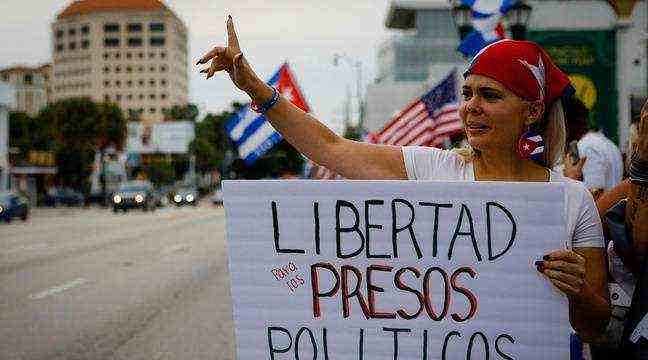Despite the firm ban by the Communist authorities, they fully intend to march. Not to celebrate the return of tourists, but to demand the release of political prisoners. The Cuban opposition has planned to demonstrate this Monday, marches that promise to take place under high tension.
Since weeks, the date of November 15 – shortened in Spanish as 15N – is widely commented on on social networks and in Cuban homes: for dissent, it is an opportunity to parade in the streets of Cuba, four months after the historic and spontaneous demonstrations of July 11. During these rallies, which left one dead and dozens injured, 1,270 people were arrested, 658 of whom remain in prison, according to the NGO Cubalex.
“Our motto is peace”
Mobile internet, which arrived in Cuba at the end of 2018, has revolutionized the daily life of residents, giving rise to a civil society and giving birth to a new generation of connected dissidents. But the government, which denies the existence of political prisoners in Cuba, considers any opposition, which it accuses of being funded by Washington, to be illegal.
For the government, Monday marks above all a certain return to normalcy after months of closure of the country and schools due to the coronavirus pandemic. He also planned festivities for the 502 years of Havana. “Our motto is peace,” promised President Miguel Diaz-Canel in a televised address on Friday. And “in peace we will start on the 15th a new stage of the school year, in peace our economy will recover,” he assured, while the island is experiencing its worst economic crisis in nearly 30 years, generating strong
food and drug shortages as well as growing social discontent.
“Repressive wave”
For its part, the opposition calls for a large peaceful demonstration, in Havana and in six provinces, for “change” and the release of political prisoners. The instructions to participants: come dressed in white. But it is difficult to say whether the call will be widely followed, when the confrontation is at its height between defenders and critics of the government.
Authorities accuse the organizers of being agents trained and paid by the United States to bring about regime change. For this reason, they banned the assembly and threatened criminal sanctions. What to dissuade some, while sentences of up to 30 years in prison have been requested against demonstrators of July 11, according to independent Cuban media.
Not to mention that, unlike July, there will no longer be the effect of surprise, in this country where the large police and military presence generally dissuades any attempt to gather. In recent days, many dissidents, protest promoters and independent journalists have denounced on social networks being blocked at home by the police. In an open letter published on Sunday, some forty civil organizations in Cuba and abroad denounced “the repressive wave which has intensified in the country against the organizers of the demonstration and the citizens who identify with it”.
“Campaign against Cuba”
On Sunday, playwright Yunior Garcia, 39, creator of the political debate group on Facebook Archipiélago behind the call to demonstrate, was prevented from going out to parade alone, a white rose in his hand, as he wished. do so for fear of violence the next day.
Throughout the day, plainclothes agents stationed in front of his door, at the foot of his building and on the roof immobilized him at his home, in the popular district of La Coronela in Havana, even covering his windows with gigantic flags. “We are living very dark days in Cuba,” he lamented in a video posted on Facebook.
Washington and Paris reactions
President Diaz-Canel denounced a desire to “disrupt internal order” and a “media campaign against Cuba”. In this context, Washington is worried. US Secretary of State Antony Blinken called on “the Cuban government to respect the rights of Cubans, letting them come together peacefully.” He also urged him to let the demonstrators “express themselves without fear of reprisals or violence, and by letting them exchange information freely via the Internet and telecommunications lines”, in reference to the Internet cuts that occurred in July during demonstrations and the following days.
France also took the floor, asking Cuba to respect the right of its citizens to demonstrate. “We call on the Cuban government to guarantee the right of the Cuban people to assemble and demonstrate peacefully,” the French foreign ministry said in a statement, with France following “with concern” the situation in Cuba. Paris also asks the Cuban authorities to “return their accreditation to the journalists” of the Spanish agency Efe stationed in Cuba, withdrawn on the eve of the rally. Two of the five journalists concerned, however, recovered theirs, their leader Atahualpa Amerise told AFP on Sunday.

